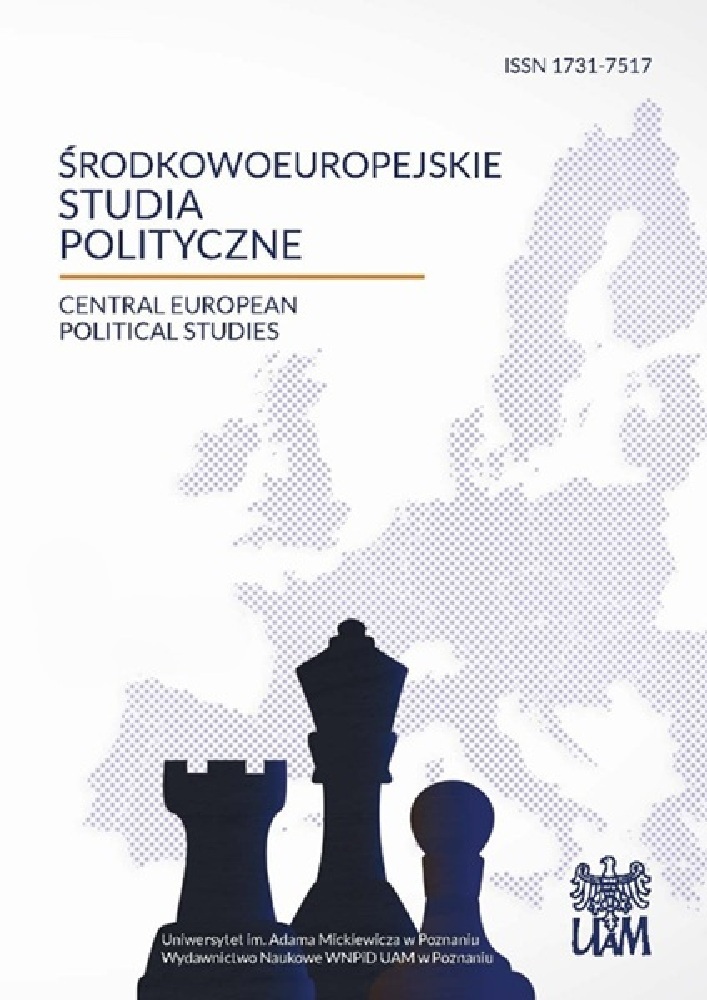Abstract
The paper describes the latest change in the research on social and economic development of states. This change is characterized mainly by a strong emphasis put on the role of institutions as key instruments of reducing the development gap between countries. It is argued that in the years after 1989 institutions have disappeared from mainstream academia and major intellectual debates because of: (1) the widespread belief in global convergence of capitalism and (2) the modernization theory which prevailed in the social science in the 1990s. The article indicates that institutions were once again brought into focus as a result of (1) a wider debate about the institutional sources of growth and development sparked by Acemoglu and Robinson’s Why Nations Fail, (2) the beginning of the global economic crisis of 2008 triggered by the fall of American investment bank Lehman Brothers (3) diversified consequences of the economic crisis seen all over Europe and the USA which illustrate (4) the institutional varieties of capitalism.
References
AcemogluD., Robinson A. J. (2012), Why Nations Fail: The Origins of Power, Prosperity and Poverty, Profile Books, London.
Berman S. (2006), The Primacy o f Politics: Social Democracy and the Making of Europes Twentieth Century, Cambridge University Press, New York.
Blyth M. (2002), Great Transformations: Economic Ideas and Institutional Change in the Twentieth Century, Cambridge University Press, New York.
Blyth M. (2006), Instytucje i idee, in: Teorie i metody w naukach politycznych, eds. D. Marsh, G. Stoker, Wydawnictwo Uniwersytetu Jagiellońskiego, Kraków.
BlythM. (2013), Austerity: The History o f a Dangerous Idea, Oxford University Press, New York.
Castells M., Caraęa J., Cardoso G. (2012), Aftermath. The Cultures o f the Economic Crisis, Oxford.
Fukuyama F. (2009), Koniec historii, Wydawnictwo Znak, Kraków.
Fukuyama F. (2012), Acemoglu and Robinson on Why Nations Fail, “The American Interest”, 26.03.2012, http://www.the-american-interest.com/fukuyama/2012/03/26/acemoglu-and-robinson-on-why-nations-fail/, 17.09.2014.
Geodecki T., Gorzelak G., Górniak J., Hausner J., Mazur S., Szlachta J., Zaleski J. (2012), Kurs na innowacje. Jak wyprowadzić Polskę z rozwojowego dryfu, Fundacja Gospodarki i Administracji Publicznej, Kraków.
Gray J. (2006), Al-Kaida i korzenie nowoczesności, Fundacja Aletheia, Warszawa.
Hall P. A., SoskiceD. (2001), Varieties o f Capitalism: The Institutional Foundations of Comparative Advantage, Oxford University Press, Oxford. Historians versus economists (2012), “The Economist”, 13.04.2012, www.economist.com/blogs/buttonwood/2012/04/duelling-academics, 17.09.2014.
Jackson T. (2009), Prosperity without Growth: Economics fo r a Finite Planet, Earthscan, New York.
Jasiecki K. (2013), Kapitalizm po polsku. Między modernizacją a peryferiami Unii Europejskiej, Wydawnictwo IFiS PAN, Warszawa.
Jessop B., Oosterlynck S. (2008), Culturalpolitical economy: On making the cultural turn withoutfalling into soft economic sociology, “Geoforum”, vol. 39, no. 3.
Lowndes V. (2006), Instytucjonalizm, in: Teorie i metody w naukach politycznych, eds. D. Marsh, G. Stoker, Wydawnictwo Uniwersytetu Jagiellońskiego, Kraków.
McAnulla S. (2006), Struktura a podmiotowość, in: Teorie i metody w naukach politycznych, eds. D. Marsh, G. Stoker, Wydawnictwo Uniwersytetu Jagiellońskiego, Kraków.
PedersenO. K. (2010),Institutional Competitiveness:HowNations Came to Compete, in: The OxfordHandbook o f Comparative Institutional Analysis, eds. G. Morgan, J. Campbell, C. Crouch, O. K. Pedersen, R. Whitley, Oxford University Press, Oxford.
Skidelsky R., Skidelsky E. (2012), How Much Is Enough?: Money and the Good Life, Other Press, New York.
Sosnowska A. (2004), Zrozumieć zacofanie. Spory historyków o Europę Wschodnią (1947-1994), Wydawnictwo TRIO, Warszawa.
Staniszkis J. (2003), Władza globalizacji, Wydawnictwo Naukowe Scholar, Warszawa. The bigwhy (2012), “The Economist”, 10.03.2012, http://www.economist.com/node/21549911, 17.09.2014.
Welzer H. (2013), Selbst Denken. Eine Anleitung Zum Widerstand, S. FISCHER, Frankfurt am Main.
Wieviorka M. (2011), Dziewięć wykładów z socjologii, Zakład Wydawniczy NOMOS, Kraków.
Williamson J. (1990), What Washington Means by Policy Reform, in: Latin American Adjustment: How Much Has Happened?, ed. J. Williamson, Peterson Institute for International Economics, Washington.
Zybała A. (2013), Państwo i społeczeństwo w działaniu. Polityki publiczne wobec potrzeb modernizacji państwa i społeczeństwa, Difin, Warszawa.
License
Copyright
© 2015, Uniwersytet im. Adama Mickiewicza w Poznaniu, Wydawnictwo Naukowe Instytutu Nauk Politycznych i Dziennikarstwa
OPEN ACCESS
